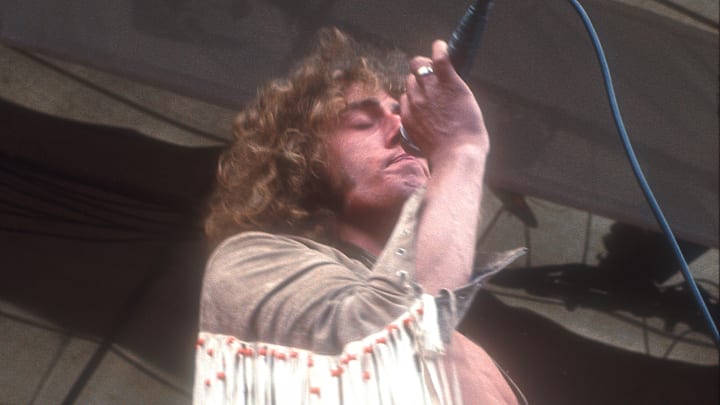I did not set out to piss off Roger Daltrey, but apparently I did. You see, I’m one of those music fans who looks at setlists before shows. I even go so far as to upload setlists of shows I have seen to internet sites so others can do the same. According to Daltrey, that makes me part of the problem.
Earlier this week, Far Out Magazine’s Dale Maplethorpe reported Daltrey’s disdain for the practice. The lead singer of the Who resents the fact that everyone seems to know what songs are coming next during live performances. “There’s no surprises left in concerts these days,” Maplethorpe quotes the 80-year-old as saying.
Let’s get this out of the way up front. Roger Daltrey knows more about what makes a rock show successful than most people in the world. He certainly knows more about it from a performer’s perspective than I will ever know. Daltrey began playing with his first band, the Detours before I was born. And I am old.
Roger Daltrey has an issue with something you might be doing
But maybe – just maybe – I can offer a different perspective. A fan’s perspective. The first obvious counterargument to Daltrey’s complaints is this: if bands don’t want fans to know what song is coming next, perhaps they should vary their setlists from show to show. Because I’ve got to say, setlists were circulating long before the internet era. Anyone who went to Grateful Dead shows back in the ‘70s and ‘80s could find out what was likely to be played in advance had they been so inclined.
In May of 2023, the Avett Brothers played three consecutive nights at Wolf Trap in Vienna, Virginia. On the first night, they played 24 songs. Second and third nights – 25 songs. Out of the 74 numbers they performed over the course of those three nights, guess how many they repeated.
Seven. They only repeated seven songs. A couple of their best-loved tunes (“Ain’t No Man,” “Head Full of Doubt”) showed up all three nights. A few others were played twice. All in all, over those three shows, the Avetts played 64 different songs.
I know this because my nephew went to all three shows and told me the one show I saw was radically different from the others. I trust my nephew, but even if I didn’t, I can look up those setlists online to confirm his statement.
But, you may argue, the Avett’s combined age is scarcely more than Daltrey’s. Maybe it’s not reasonable to expect an older performer like Daltrey to rehearse and remember completely different shows for each night of a tour. For the answer to that, let’s look at a different performer.
I’ve seen Richard Thompson more times than I can count. Thompson, who is just a few years younger than Daltrey, does similar shows each night of a tour. Sometimes, over the course of multiple tours. I know he’s going to play “1952 Vincent Black Lightning” in the early middle of his set and follow it up with “Valerie” a song or two later. He’ll probably do “Beeswing” in the late middle, and “I Want to See Bright Lights Tonight” toward the end, The last few years, he has been doing “Walking the Long Miles Home” right around the middle of the show, telling the same story about the song’s origin.
See, I already know a lot of the setlist for a Thompson show whether I look it up or not. But Thompson always throws in several wild cards. Every time I see him, he offers at least three surprises. Traditional folk songs or rarities from his early albums. It isn’t uncommon for there to be something from his Fairport Convention days, but you never know exactly what it will be.
And those wild cards change from night to night, so no advanced knowledge can spoil the surprise. Changing just a few songs – or even the order of those songs – can create a very different experience, one that conveys the surprise that Daltrey claims has vanished. With just a little effort, the artist can re-introduce that element.
I don’t think knowing the setlist in advance has ever taken away from my excitement upon hearing a particular song. And contrary to Daltrey’s complaint, I think sometimes it has helped. That speaks to the way some fans (like me) use setlists.
I rarely check setlists from artists that I already know. As I said, I know Richard Thompson’s catalog well enough already. But I do check them quite a bit if I am seeing a band with whom I am less familiar. I check the setlist and then I listen to the songs in advance.
You may not have the same reaction here, but I find having heard a song – even if it’s just one time – allows me to enjoy that song far more when I hear it live. I have a theory on this which doesn’t really need to be mentioned here. Because the fact is – I know this system works for me. If it doesn’t work for you, then I suspect you’re not one of those Philistines checking out setlists prior to a show.
So I regret upsetting a singer who I have loved listening to for fifty-plus years, but I still humbly disagree. Setlists can be useful tools for some fans. They can be disregarded by other fans. And I can assure Roger of at least one thing. If I’m seeing the Who and I hear that opening ostinato of “Baba O’Riley,” I’m screaming my head off – whether I knew it was coming or not.
